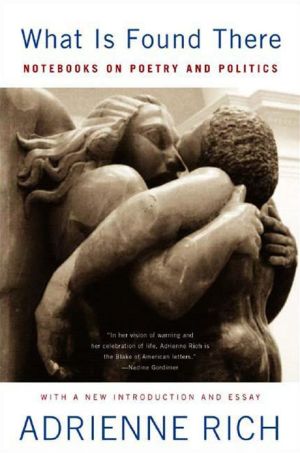

 |

|

The average rating for What Is Found There: Notebooks on Poetry and Politics based on 2 reviews is 4.5 stars.
Review # 1 was written on 2013-05-10 00:00:00 James Murphy James MurphyAn incredibly inspiring and challenging collection of essays on poetry, particularly its politically transformative dimension. While Rich does speak about and from the USA, this is not so much a limitation but an implied challenge to the reader to think through their own context. From the final essay: "A revolutionary poem will not tell you who or when to kill, what and when to burn, or even how to theorize. It reminds you (for you have known, somehow, all along, maybe lost track) where and when and how you are living and might live - it is a wick of desire... It is not programmatic: it searches for words amid the jamming of unfree free-market idiom, for images that will burn true outside the emotional theme-parks. A revolutionary poem is written out of one individual's confrontation with her/his own longings (including all that s/he is expected to deny) in the belief that its readers or hearers deserve an art as complex, as open to contradictions, as themselves." |
Review # 2 was written on 2018-05-16 00:00:00 Kevin Gnipp Kevin GnippA beautiful reminder to aspiring poets and those who read poetry. Adrienne Rich's book dismantles common conceptions of poetry as merely "resting on the given" and revitalizes poetry's connection to the "multi-various shadings of human life" and "the heartbeat, memories, images of strangers." She introduces the poet as a kind of global citizen, that one should "track their own desire" as a found object and communicate this to the world, however that desire is able to manifest poetically. For Rich, it is important that the poet gives voice to one's own set of experiences' experiences shaped by one's class, race, gender and overall situation within the world. I loved the examples throughout: Phillis Wheatley, June Jordan, Francisco X. Alcaron. The notebooks are approachable and take you through the experience of being a poet in America, faced with everything that we take for granted in poetry and in our lives. The text made me increasingly aware that poetry for aesthetic purposes is really not enough, that for some poetry serves as sustenance rather than luxury. And not to take the canon for granted, filled with individuals that give us only a certain kind of perspective. A new conception of poetry arises: the poet interweaves the politics into the poetry; the poet challenges the politics that inherently exist within poetry as a system. Poetry and politics are intertwined and, together, create a conception of poetry as an active form of resistance, witness, and art. What a vocation! I wish I had read this sooner. |
CAN'T FIND WHAT YOU'RE LOOKING FOR? CLICK HERE!!!